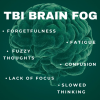Neurofatigue is a condition in which an individual experiences mental exhaustion. It is when your brain overworks itself and becomes “tired” due to a disruption in the brain’s circuitry system. After a brain injury, your brain has to use more energy to send electrical signals, thus making you feel more fatigued as usual. This can affect our motivation, our activity level, our emotions, and our daily functioning.
There are two types of neurofatigue: cognitive neurofatigue and pathological neurofatigue.
| Type of Neurofatigue | Definition | Example |
| Cognitive | A condition in which the brain has to work harder during certain tasks and has to use lots of energy to keep up | Quickly feeling fatigued from:
|
| Pathological | A condition in which you feel physical fatigue after putting little effort into doing daily activities | Feeling physically tired from:
|
Neurofatigue usually occurs when an individual engages in activities with many demands or prolonged cognitive tasks. It can also happen during situations with a high amount of sensory stimulation, such as a noisy environment. Symptoms of neurofatigue may include:
- Rapidly feeling drained after mental activity
- Feeling more fatigued towards the end of the day
- Difficulty concentrating or paying attention
- Sleep disruptions
- Mood swings or irritability
- Difficulty tolerating stress
- Headaches
- Dizziness
- Sensitivity to light or loud noise
General strategies that individuals with neurofatigue can utilize are:
- Recognize triggers of fatigue
- Plan frequent and regular breaks in your daily schedule
- Pace yourself during activities
- Break down activities into smaller steps
- Get 8-10 hours of sleep
- Exercise
- Eat healthy and nutritious meals
- Yoga or meditation
References
https://www.braininjury-explanation.com/consequences/invisible-consequences/neurofatigue



